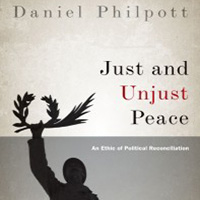Daniel Philpott’s book, Just and Unjust Peace, can be regarded as a milestone for policymakers and academics looking for ways…
Just and Unjust Peace

“What is justice in the wake of large-scale injustice?” Daniel Philpott asks.
Just and Unjust Peace is his deep and hopeful answer that question.
Analyzing mainstream thought in the United Nations, developed countries, and the human rights community, Philpott challenges current peacebuilding practices. Instead, he introduces an ethic of reconciliation rooted in the three Abrahamic religious traditions and consistent with modern constitutional-democratic and international norms, presenting six practices to be applied in post-crisis contexts to effect a peace that is at once just, fulfilling, and long-lasting.
This forum brings together academic participants from a range of related disciplines as they reflect on Philpott’s quest for a universal standard of reconciliation and soulcraft.
A new theory on political wounds
Daniel Philpott has written an impressive book that offers a new conception of political reconciliation for the field of transitional…
Justice and reconciliation
Recent history is full of episodes of egregious, widespread and often systematic wrongdoing: genocide, torture, and mass killing. Cambodia, South…
Janus-faced justice
One of Philpott’s goals in Just and Unjust Peace is to challenge both sorts of reactions to the role of…
Recasting an agenda for peace
The International Criminal Court (ICC) celebrated its ten-year anniversary last summer. During its first decade of life, both the shadow…
Reconciliation and the pursuit of peace
Today, at the beginning of 2013, the world is confronted by a bewildering array of protracted and new armed conflicts:…
Reconciliation in the real world
In Just and Unjust Peace: An Ethic of Political Reconciliation, I argue that religious traditions—Judaism, Christianity, and Islam in particular—offer…












